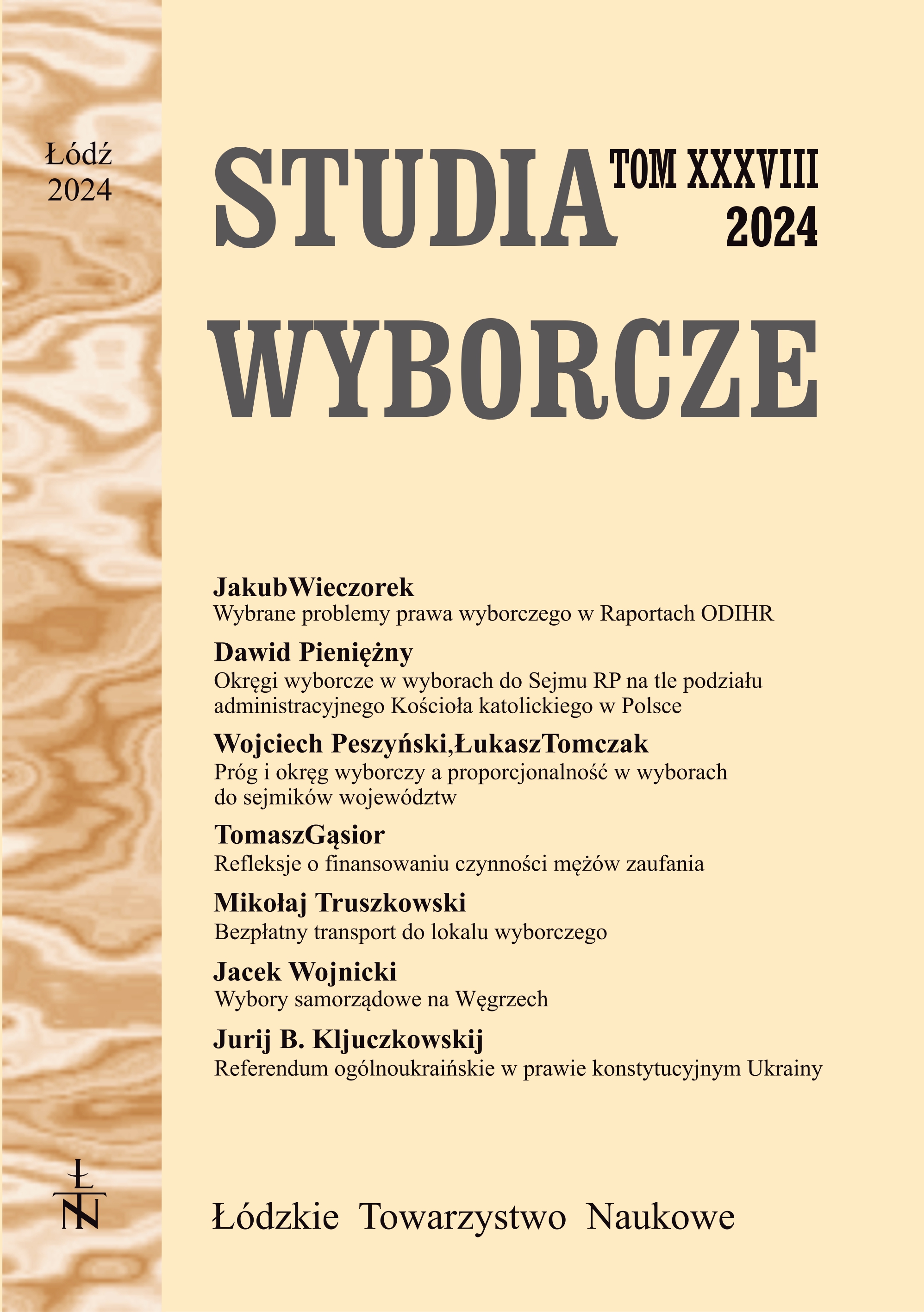Local elections in Hungary – evolution of law and slow exchange of entities
DOI:
https://doi.org/10.26485/SW/2024/38/6Keywords:
Hungary, local government, local elections, decentralizationAbstract
Hungary is subdivided administratively into 19 counties (megyék, singular: megye) and the capital city (főváros) Budapest. The counties are further subdivided into 175 districts (járások, singular: járás). The capital Budapest is subdivided into 23 districts (kerületek, singular: kerület). There are 23 towns with county’s rights (megyei jogú városok, singular: megyei jogú város), sometimes called urban counties. The local authorities of these towns have extended powers, but they are not independent territorial units. Local government in Hungary is composed of municipal councils and mayors for all villages, towns, and cities in the country, including the 23 districts of Budapest, as well as general assemblies for all of its 19 counties (megye) and the city of Budapest. Local-government elections are held every five years during the autumn following regular spring National Assembly elections (every four years). Local-government elections were most recently held in Hungary on October 13, 2019. Candidates from the Fidesz–Christian Democratic People’s Party (KDNP) alliance that has commanded an overwhelming majority in Hungary’s National Assembly over the past three parliamentary cycles dominated 2019 local elections in towns and cities, including Budapest, as well as at the county level, while – as customary – nominally independent candidates dominated these elections in small towns and villages.
References
Bozőki Andreas. 1991. Narodziny nowego ładu politycznego na Węgrzech. W: Wybory i narodziny demokracji w krajach Europy Środkowej i Wschodniej, red. Jacek Raciborski. Warszawa: Wydawnictwo Naukowe Scholar.
Brodziński Witold. 2012. Ustawa Zasadnicza Węgier, seria „Konstytucje Państw Świata”. Warszawa: Wydawnictwo Sejmowe.
Czyż Anna. 2007. „Samorząd terytorialny na Węgrzech”. Samorząd Terytorialny 1–2: 131–141.
Czyż Anna. 2009. „Samorząd terytorialny w Republice Węgierskiej”. W: Samorząd terytorialny w Europie Środkowej i Wschodniej, red. Marek Barański. Toruń-Katowice: Wydawnictwo Adam Marszałek.
Czyż Anna. 2010. Samorząd terytorialny w państwach Grupy Wyszehradzkiej. Dąbrowa Górnicza: Wyższa Szkoła Biznesu.
Donath Halina. 1996. Konstytucja Republiki Węgierskiej, seria „Konstytucje Państw Świata”. Warszawa: Wydawnictwo Sejmowe.
Héjj Dominik. 2019. „Wybory samorządowe na Węgrzech – Fidesz–KDNP traci Budapeszt, ale wygrywa w całym kraju”. Komentarze IEŚ 70.
Horváth Tamás M. 1994. „Podstawowe informacje o władzach lokalnych w Republice Węgierskiej”. W: Władze lokalne w Europie Centralnej i Wschodniej oraz we Wspólnocie Niepodległych Państw. Budapeszt: Open Society Institute.
Hungary. 2003. W: The Visegrad Yearbook 2003, red. Ádám Kégler. Budapest: Central European Student Partnership Organisation.
Illner Mihal. 2001. Decentralization Reforms in Three East Central European Candidate Countries – the Czech Republic, Hungary, Poland 1990–2001. Prague: Academy of Sciences of the Czech Republic.
Jóźwiak Veronika. 2019. „Wybory samorządowe na Węgrzech”. Komentarz PISM 52.
Maruszański Jarosław, Wasilewska Regina. 1997. „Węgry”. W: Europa Środkowo-Wschodnia 1994–1995. Rocznik IV–V. Warszawa: Instytut Studiów Politycznych PAN: 270.
Olejniczak-Szałowska Elżbieta. 1992. „Zadania i ustrój samorządu terytorialnego na Węgrzech”. Samorząd Terytorialny 9: 54–70.
Rajca Lucyna. 2019. Reformy samorządu terytorialnego na Węgrzech i w Polsce. Warszawa: Dom Wydawniczy Elipsa.
Swianiewicz Paweł. 2002a. „Modele samorządu terytorialnego w krajach Europy Zachodniej oraz Środkowowschodniej – próba generalizacji”. Studia Regionalne i Lokalne 4(10): 49–57.
Swianiewicz Paweł. 2002b. Consolidation or Fragmentation? The Size of Local Government in Central and Eastern Europe. Budapest: Open Society Institute.
Temesi István. 2000. Local Government in Hungary. W: Decentralization: Experiments and Reforms, red. Tamás M. Horváth. Budapest: Local Government and Public Service Reform Initiative.
Tyszka Franciszek. 2019. „Wybory samorządowe na Węgrzech: duże miasta dla opozycji”. Analizy OSW, 15 października.
Wojnicki Jacek. 2008. Samorząd lokalny w Polsce i w Europie. Pułtusk: Akademia Humanistyczna im. Aleksandra Gieysztora.
Wojnicki Jacek. 2014. Decentralizacja władzy publicznej w państwach Europy Środkowo-Wschodniej. Aspekt ustrojowo-politologiczny. Warszawa: Difin.
http://www.valasztas.hu/en/onkval/2014/443/443_o_index.html (dostęp 26.03.2019).
http://www.valasztas.hu/onkval2002/so02/turnout_results_ind.en.htm (dostęp 26.03.2019).
http://www.valasztas.hu/onkval2006/en/20/20_0.html (dostęp 26.03.2019).
https://fr.wikipedia.org/wiki/elections_municipales_hongroises_de_2019 (dostęp 26.03.2019).
https://portal.valasztas.hu/napkozbeni-reszveteli-adatok_onk2019 (dostęp 26.03.2019).
https://www.valasztas.hu/helyi-onkormanyzati-valasztasok-2019 (dostęp 26.03.2019).
The Fundamental Law of Hungary of 25 April 2011.
Act LXV of 1990 on Local Governments.
Act LXIV of 1990 on the Election of Representatives and Mayors of Local Self-governments.
Act C of 1990 on Local Taxes.
Act XVI of 1991 on Concessions.
Act XXXIII of 1991 on Transfer of Certain States Properties to the Ownership of Local Self-governments.
Act LXIV of 1994 on the Election of Local Representatives and Mayors.
Act L of 2010 on the Election of Municipal Representatives and Mayors.
Act CLXXXIX of 2011 on Local Government in Hungary.
Act XXVI of 2013 on Electoral Procedure (kolejne zmiany dokonane na mocy Act CCVII of 2013).
Downloads
Published
How to Cite
Issue
Section
License
Copyright (c) 2024 Łódzkie Towarzystwo Naukowe

This work is licensed under a Creative Commons Attribution 4.0 International License.



